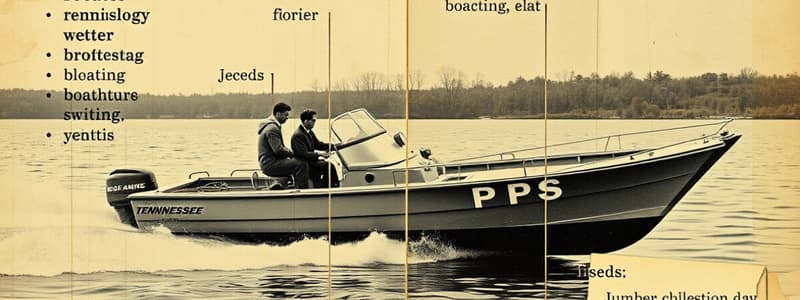Podcast
Questions and Answers
What does 'Bow' refer to?
What does 'Bow' refer to?
- Rear of vessel
- Front of vessel (correct)
- Left side
- Right side
What is the meaning of the term 'Stern'?
What is the meaning of the term 'Stern'?
Rear of vessel
What does 'Starboard' indicate?
What does 'Starboard' indicate?
- Right side (correct)
- Front of vessel
- Left side
- Rear of vessel
What is the term for the left side of a vessel?
What is the term for the left side of a vessel?
Define 'Hull'.
Define 'Hull'.
What is a 'Gunwale'?
What is a 'Gunwale'?
What is the function of a 'Propeller'?
What is the function of a 'Propeller'?
What does 'Beam' refer to?
What does 'Beam' refer to?
What is 'Freeboard'?
What is 'Freeboard'?
Define 'Draft'.
Define 'Draft'.
What is the purpose of a 'Keel'?
What is the purpose of a 'Keel'?
What is a 'Displacement Hull'?
What is a 'Displacement Hull'?
What is a 'Planing Hull'?
What is a 'Planing Hull'?
What is a 'Flat Bottom Hull' used for?
What is a 'Flat Bottom Hull' used for?
Define 'Deep Vee Hull'.
Define 'Deep Vee Hull'.
What does 'Multi-Hull' refer to?
What does 'Multi-Hull' refer to?
What is the meaning of 'Length Class A'?
What is the meaning of 'Length Class A'?
What does a 'Give-way Vessel' mean?
What does a 'Give-way Vessel' mean?
What is a 'Float Plan'?
What is a 'Float Plan'?
What is the function of 'Halyards'?
What is the function of 'Halyards'?
Define 'Capsize'.
Define 'Capsize'.
Study Notes
Boating Terminology
- Bow: Front part of the vessel.
- Stern: Rear part of the vessel.
- Starboard: Right side of the boat.
- Port: Left side of the boat.
- Hull: Main body of the vessel.
- Gunwale: Upper edge of the vessel's side.
- Cleat: Metal fitting used to fasten ropes.
- Propeller: Device that rotates to power the boat.
- Beam: Width of the vessel.
- Freeboard: Distance from the water to the lowest point of the boat.
- Draft: Depth of water necessary for the vessel to float.
- Keel: Extension of the hull that enhances stability.
Types of Hulls
- Displacement Hull: Moves through water by displacing it; common in sailboats.
- Planing Hull: Rises and glides on the water's surface; typically used in power boats and PWCs.
- Flat Bottom Hull: Shallow draft ideal for fishing in lakes and rivers.
- Deep Vee Hull: Provides smoother rides in rough water; requires more power to plane.
- Round Bottom Hull: Typical displacement hull; moves easily but can roll without deep keel.
- Multi-Hull: Provides great stability due to a large beam; exemplified by catamarans.
Length Classes
- Length Class A: Less than 16 feet.
- Length Class 1: 16 feet to less than 26 feet.
- Length Class 2: 26 feet to less than 40 feet.
- Length Class 3: 40 feet to less than 65 feet.
Engine Types
- Outboard Engine: Offers more power per weight; usually a 4-stroke engine.
- Inboard Engine: An automotive engine reconfigured for marine application; drives a propeller via a drive shaft.
- Stern Drive (Inboard/Outboard): Features an outdrive connected to an engine housed within the boat.
- Jet Drive: Common in PWCs; propels water out the back for movement.
Boat Components
- Tiller: Lever for turning the rudder.
- Transom: Surface at the back of the hull.
- Intake: Hull opening that draws water to the impeller.
- Intake Grate: Screening cover that prevents debris from entering the intake.
- Drive Shaft: Connects motor to impeller.
Navigation and Safety
- Steering Nozzle: Directs the water stream to steer a PWC.
- Halyards: Lines used for raising and lowering sails.
- Sheets: Lines that control sail angles relative to the wind.
- Float Plan: Notifies someone of your intended route and timing on the water.
- Swamp: To fill a vessel with water; a safety concern.
- Capsize: When a vessel turns on its side or completely over.
People Capacity Calculation
- Use the formula: Number of people = (boat length x boat width) / 15.
Trailer and Towing
- Coupler: Part of the trailer that connects to the towing vehicle's hitch.
- Bunks: Wooden supports on which the vessel rests while on the trailer.
Navigation Rules
- Give-way Vessel: Required to take early action to avoid collision.
- Stand-on Vessel: Must maintain course and speed unless the give-way vessel changes course.
Wind and Light Indicators
- Leeward: Direction wind blows toward, or downwind.
- Windward: Direction wind blows from, or upwind.
- Sidelights: Red for port side, green for starboard side.
- Sternlight: White light located at the back of the boat.
Studying That Suits You
Use AI to generate personalized quizzes and flashcards to suit your learning preferences.
Description
Test your knowledge with these flashcards designed for the Tennessee Boating License. Each card presents key boating terms and their definitions, perfect for quick study. From the bow to the gunwale, ensure you're familiar with essential vocabulary for safe boating.




